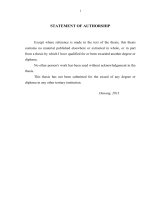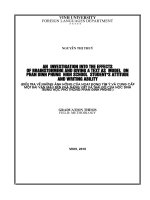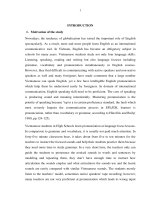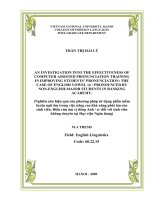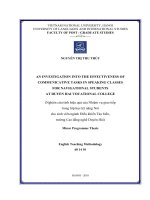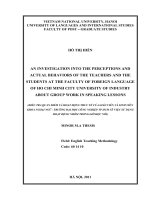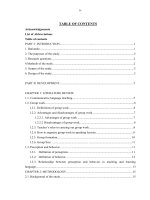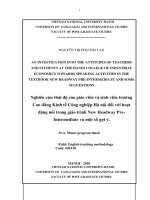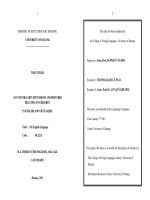AN INVESTIGATION INTO THE EFFECTIVENESS OF TEACHERS’ FEEDBACK STRATEGIES IN ENGLISH SPEAKING SKILL IMPROVEMENT FOR THE THIRDYEAR STUDENTS AT PEOPLE’S POLICE COLLEGE I
Bạn đang xem bản rút gọn của tài liệu. Xem và tải ngay bản đầy đủ của tài liệu tại đây (89.62 KB, 18 trang )
MINISTRY OF EDUCATION AND TRAINING
HANOI UNIVERSITY OF BUSINESS AND TECHNOLOGY
HỨA MINH HẢI
AN INVESTIGATION INTO THE EFFECTIVENESS OF TEACHERS’ FEEDBACK STRATEGIES IN ENGLISH SPEAKING SKILL
IMPROVEMENT FOR THE THIRD-YEAR STUDENTS AT PEOPLE’S POLICE COLLEGE I
MA. THESIS IN ENGLISH LINGUISTICS
HANOI, 2018
MINISTRY OF EDUCATION AND TRAINING
HANOI UNIVERSITY OF BUSINESS AND TECHNOLOGY
HỨA MINH HẢI
AN INVESTIGATION INTO THE EFFECTIVENESS OF TEACHERS’ FEEDBACK STRATEGIES IN ENGLISH SPEAKING SKILL IMPROVEMENT
FOR THE THIRD-YEAR STUDENTS AT PEOPLE’S POLICE COLLEGE I
Field: English Languistics
Code: 60.22.02.01
Supervisor: Đặng Nguyên Giang, Ph.D
HANOI, 2018
CHAPPTER I: INTRODUCTION
1.1 Rationale
-
The language errors play an important role in language learning and in assessing learners’
performance.
Students’ speaking errors should be paid attention carefully and seriously by the teachers of
English
The importance of teachers’ feedback for students’ errors in their learning success and
achievement
The practical hypothesis at PPC I that the application of teachers’ feedback strategies affects
students’ speaking competence to some extent.
•
-
1.2 aims and objectives of the study
improve the third-year students’ English speaking skill at PPC I.
Exploring the teachers’ beliefs and their application of feedback strategies to the
third- year students’ speaking errors
-
Investigating the third-year students’ attitudes towards the teachers’ application
of speaking error feedback strategies
1.3. Research question
- What are the teachers’ beliefs and their feedback strategies applied to the students’
speaking errors at PPC I?
-
What are the third-year students’ attitudes towards the teachers’ speaking error
feedback strategies?
1.4. Scope of the study
-third- year students in three classes at People’s Police College I, Hanoi.
1.5. Research Methods
-
The data will be collected via questionnaires, class observations and interviews.
1.6. Significance of the Study
- Enhance students’ learning success and achievement
-
•
•
Provide teachers of English with a number of useful pedagogical implications in terms
of feedback
help enhance students’ speaking performance.
1.7. Structure of the Study
The thesis is composed of five chapters: (Introduction, Literature Review, Methodology,
Findings and Discussions, Conclusion)
CHAPTER 2: LITERATURE REVIEW
2.1. Communicative Language Competence and Second Language Acquisition
-
To help students achieve communicative competence
Deals with how the learner is influenced in a social context and how he reacts in
various social environments.
2.2. Language Errors
-helps make clear about error in second language learning process
-
help students understand that errors are a natural part of language learning process
2.3. Feedback Strategies
-
Feedback defined
The Importance of Feedback
Teachers’ Beliefs in Feedback
Students’ Attitudes towards Feedback
2.4. Speaking Errors
-
Speaking Errors Defined
Speaking Errors Classified
2.5. Feedback Strategies for Speaking Errors
-
Types of Feedback Strategies for Speaking Errors
The Selection of Errors to Give Feedback
The Selection of People Giving Correction (Teacher- Correction, PeerCorrection,and Self- Correction.)
2.6. Previous Studies on Feedback Strategies for Students’ Speaking Errors
- The types of feedback strategies were made use of in the real teaching and they led
to different effects
CHAPTER 3: METHODOLOGY
- Setting of the Study
-
Research Design
Participants
Data Collection Instruments
Questionnaires for the Teachers
Questionnaires for the Students
Semi-Structured Interviews with the Teachers
Class Observation
Data Collection and Analysis Procedures
CHAPTER 4: FINDINGS AND DISCUSSIONS
4.1. Research Question 1: Teachers’ Beliefs and their Application of Speaking Error
Feedback Strategies
4.1.1. Teachers’ Beliefs in Feedback
4.1.1.1. Results from Teachers’ Questionnaire
- collecting and analysing teachers’ beliefs on feedback strategies for students’ speaking
errors are necessary and helpful because their beliefs will have much influence on their
use of feedback in the classroom settings
4.1.2. Teachers’ Application of Feedback Strategies
4.1.2.1. Results from Teachers’ Questionnaire
- Chart 4.1. Types of Errors Teachers Give Feedback
for Individuals and for the Whole Class
- Chart 4.2. Characteristics of Errors for Teachers to Give Feedback
-
Chart 4.3. Teachers’ Frequency of Giving Feedback
Chart 4.4. Time of Giving Feedback for Individual and the Whole Class
Chart 4.5. Types of Feedback from Teachers’ Questionnaire
Chart 4.6. Error Corrector for Individual and the Whole Class
4.1.2.2. Results from Teachers’ Interviews
-
Chart 4.7. Time of Giving Feedback from Class Observation
Chart 4.8. Teachers’ use of Feedback Types from Class Observation
Chart 4.9. The Selection of Correctors from Class Observation
4.2. Research Question 2: Students’ Attitudes towards Teachers’ Speaking Errors
Feedback Strategies.
4.2.1. Results from Students’ Questionnaire.
- Table 4.2. Questionaire for Students Receiving Individual Feedback.
-
Table 4.3. Questionnaire for Students Receiving Feedback for the Whole Class
4.3. Summary
-
Both teachers and students show awareness about the necessity of the feedback for
students speaking errors and students express the need for more error correction
CHAPTER 5: CONCLUSION
5.1. Recapitulation
-
Aware that all of these intruments are applied to achieve the objectives of the study
data collection and data analysis procedure are fully presented with 6 steps with
Appendix A, Appendix B, Appendix C, Appendix D and Appendix E
5.2. Concluding Remarks
-
Teachers’ deep awareness about the importance of feedback in language teaching and
learning
-
apply feedback types that help students self-correct, they took advantage of explicit
correction and recasts
-
students show more satisfaction than those who received feedback for the whole
class.
5.3. Pedagogical Implications
-
choose the suitable feedback types so that their feedback process is carried out
effectively
-
teachers balance between feedback time and teaching time so that students can have
as much time to practice and improve themselves
5.4. Limitations and Suggestions for Further Studies
- The factors of teachers’ age, gender, experience and students’ age, gender, proficiency,
anxiety may affect the results of the study to some extent
THANK YOU FOR LISTENING!
